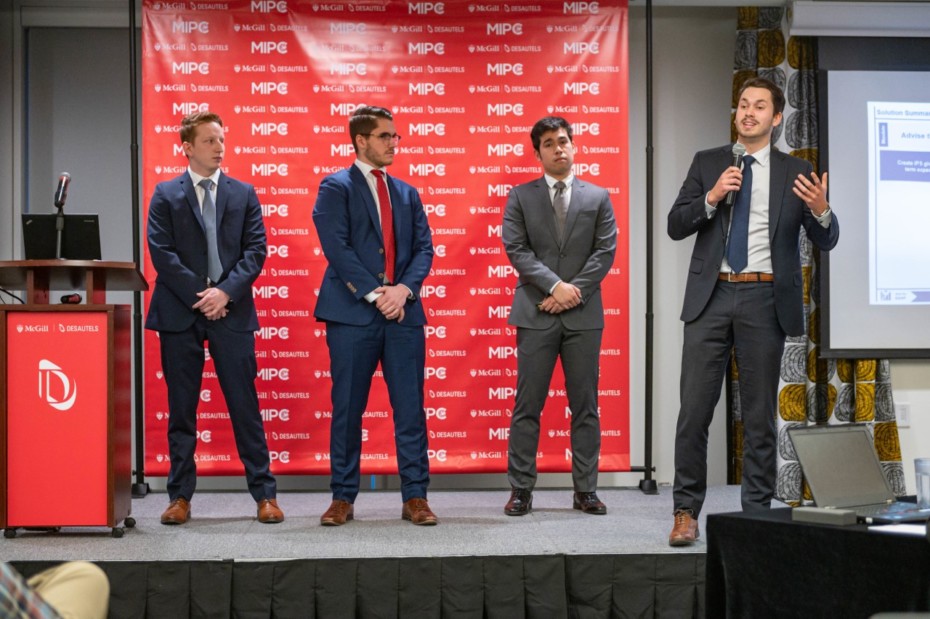
Inaugurated in 2017, the McGill International Portfolio Challenge (MIPC) is considered the pioneer of case competitions that target pensions, creative portfolio design, and institutional asset management.
HEC Montréal won the first competition in 2017, and the University of Calgary emerged victorious last year.
As today’s young generations take to the streets to voice their concerns about the climate crisis, students are leading the march to sustainability in universities. At McGill, the student-led Desautels Sustainability Network is making great strides through initiatives aiming to increase awareness and effect change within the University. At the recent MIPC, students once again proved that they can take a lead on climate issues by providing viable answers to the complex issues surrounding sustainable investing.
The call to reduce our environmental footprint and move to sustainable business practices is being heard across the world. In finance, investors have recognized the environmental impact of fossil fuels and that a profit-first mindset is detrimental both to the environment, as well as their reputation and returns, in an increasingly green-minded world. The ideal situation, of course, is to invest in companies with the highest return and the highest positive societal impact.
But while complete divestment may seem like an attractive option, there are a number of factors that need to be considered. In responding to the climate crisis, investors have found themselves in an ethical tug-of-war between the choice to immediately divest or to pursue a gradual, strategic withdrawal from the fossil fuel industry. How can we combat climate change in a way that is responsible, effective, and, most importantly, feasible?
Students offer solutions to major societal challenges
This is the question that students were faced with during this year’s McGill International Portfolio Challenge. Now in its third year, the MIPC is an annual event organized by a team of BCom students with the support of Sebastien Betermier, Professor of Finance. The world’s largest buy-side finance competition, the MIPC targets innovative portfolio design, institutional asset management, and long-term sustainability in finance.
This year’s case involved the Newfoundland and Labrador Pension Investment Board, a fictional asset management company responsible for managing the province’s three largest pension plans. Heeding the call from numerous environmental groups in the community, the case asked students to devise a plan to transition to sustainable investing.
But in an economy highly dependent on energy production and resource extraction and a diverse range of stakeholders with competing interests, this is not a simple task. From Indigenous chiefs eager to protect the land, to head of unions there to protect jobs, each board member had their own stake in the company’s investment portfolio.
Bhoomika Saxena, BCom student and Executive Director of the MIPC, says: “This competition brought students together to generate concrete solutions for real-life challenges that come with transitioning into sustainable investing. The importance of the sustainability theme was reinforced by the MIPC’s final speakers, who strongly conveyed their belief that sustainable investing is the future of investing.”
Global interest
Eighty-seven teams from 15 countries across the world responded to this year’s challenge. From there, 25 teams proceeded to the semifinals to pitch their ideas to a panel of 35 industry experts from Canada’s largest asset management firms, including CPP Investment Board, Caisse de dépôt et placement du Québec, Ontario Teachers’ Pension Plan, and Lombard Odier, to name a few.
Students in the final round understood the risks of complete divestment and acknowledged that retaining some ownership of the oil companies meant they will continue to have a swaying power over key environmental and social issues while actively pursuing diverse investments in greener sectors.
“The winning teams looked for constructive solutions that provided clear win-wins for all stakeholders and aligned the funds’ fiduciary duty to generate returns to its pensioners with long-run environmental sustainability,” says Betermier. “This is the type of thinking we need to push sustainable finance initiatives forward.”
Taking home first place and the $25,000 prize were participants from HEC Montréal, followed closely by the National University of Singapore ($10,000) and the University of Sydney ($7,500) in second and third place respectively.
A transition to greener investing
“What is great about this global challenge is that you get a large and diverse group of students from all over the world who bring different perspectives to the topic. Some of the solutions that came up this year were particularly creative and gave food for thought to the industry experts who came to judge the winning proposals,” Betermier notes. So, while students attended the event to share their passion for finance and find solutions to issues affecting investors across the world, experts were in turn able to walk away with innovative yet realistic ideas in a fine example of reverse mentoring.
There is no doubt that sustainable investing will transform the investment landscape and profoundly impact our efforts to combat climate change. Following the footsteps of environmental activist Greta Thunberg, students are forging their own path to protect the world they are inheriting.
